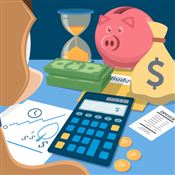Retirement Calculator
Get on track with your retirement goals. Find out your needs & how far your savings will stretch with this calculator.
 |
Saving for retirement is an important part of your financial plan.
But are you really saving enough for a long, comfortable retirement?
With this calculator, you can avoid the guesswork. It will tell you:
- The value of your income at retirement
- The value of your current savings at retirement
- How long your retirement savings will last
You'll also see how your pre-retirement and post-retirement investments will grow over time. Learn how it works and tips for retirement saving in this guide.
How to Use the Retirement Calculator
See where your retirement funding stands in just a few simple steps:
- Enter your age, current annual salary, and desired age at retirement.
- Add your current savings amount, the current inflation rate, and your expected annual salary increase.
- Enter your annual retirement contribution amount (as a percentage of your income).
- Add your current investment ROI and the ROI you expect to earn in retirement.
- Next, enter how much of your income you want to replace and the number of years you want to be funded for.
- Finally, choose 'Yes' or 'No' depending on whether you want to account for Social Security benefits.
What's the best age to retire?
Many experts encourage working until age 70 to maximize savings and Social Security benefits.[2]
Remember, you don't get health insurance until you're 65, and your money should last comfortably beyond that age.
While you can start receiving Social Security at age 62, it will be reduced if you don't retire at "full retirement age" (67 for those born in 1960 or later).[3] The income cap applies when you reach full retirement age. Additionally, the benefit amount does not decrease no matter how much you earn.
How much money do you need to retire?
Experts suggest saving 70% - 80% of your pre-retirement expenses for retirement. For example, if your monthly expenses were $2,000 before retirement, you can expect to spend $1,400 - $1,600 per month after retirement.
Generally, people spend less money in retirement than they did before retiring. Think about the commute you might no longer have, or what you save by not supporting kids.
However, this is not a guarantee. To ensure you're not overspending in retirement, carefully tally up your expenses and try to live modestly when you can.
Average Retirement Savings by Age
How do your retirement savings stack up against others your age? Review the data below from the Federal Reserve to see the average retirement savings by age. [4]
| Age Group | Average Retirement Savings |
|---|---|
| 18-24 | $4,745.25 |
| 25-29 | $9,408.51 |
| 30-34 | $21,731.92 |
| 35-39 | $48,710.27 |
| 40-44 | $101,899.22 |
| 45-49 | $148,950.14 |
| 50-54 | $146,068.38 |
| 55-59 | $223,493.56 | 60-64 | $221,451.67 |
| 65-69 | $206,819.35 |
| 70-74 | $203,964.21 |
| 75-79 | $143,613.22 |
| 80+ | $128,216.59 |
What's the best way to save for retirement?
There are a few common ways that people save for retirement. Review the most popular options in the list below to find out which account type is best for you.
401(k): A 401(k) is an employer-sponsored retirement account funded by an employee's contributions (usually a percentage of their income). In many cases, employers offer to match a certain amount of what the employee contributes.
Pros and Cons of 401(k)s
|
|
Traditional IRA: A traditional IRA is an Individual Retirement Account that you fund with pre-tax money. When you eventually withdraw money, you'll have to pay income tax on it.
Pros and Cons of Traditional IRAs
|
|
Roth IRA: A Roth IRA is an Individual Retirement Account that you fund with money that has already been taxed. You can then withdraw your Roth IRA tax-free after age 59½.
Pros and Cons of Roth IRAs
|
|
Tips for Boosting Your Retirement Savings
Here are a few ways you can maximize your retirement savings and hit your goal faster.
- Increase your annual contributions. Ideally, try to save 10%-20% of your income per year. If you can, max out your contributions for your employer-matched 401(k).
- Look for ways to boost your investment returns. Think about putting more into stocks, real estate, or ETFs.
- Try to live beneath your means and save money wherever you can. If you live more humbly, there's less potential income to replace in retirement.
- Pay down debt, especially high interest credit card debt. Any interest from debt will eat into your investment returns.
- Stash for Beginners
- Robinhood for Stocks and Cryptocurrency
- M1 Finance for Hybrid Automated Investing and DIY App
- Acorns for Investing Spare Change
- Betterment for Automatic Investing
Bottom Line
A retirement calculator like the one in this article can give you a good idea of how your current savings and contributions will stack up for retirement. Be sure to make your estimates as accurate as possible to get a reliable projection.
To boost your retirement savings, consider maxing out your contributions, especially if you have an employer-matched 401(k). And remember to pay down high-interest debt as soon as you can to avoid it eating into your savings.
References
- ^ Social Security Administration. Learn About Retirement Benefits: Planning For Retirement, Retrieved 2/16/2022
- ^ Social Security Administration. Social Security Benefits: Early or Late Retirement?, Retrieved 2/16/2022
- ^ Social Security Administration. Learn About Retirement Benefits: Deciding When To Start Retirement Benefits, Retrieved 2/16/2022
- ^ "Survey of Consumer Finances": Federal Reserve, 2019.
- ^ Internal Revenue Service. IRS announces 401(k) limit increases to $20,500, Retrieved 2/16/2022
- ^ Internal Revenue Service. Retirement Topics - Vesting, Retrieved 2/16/2022
- ^ Internal Revenue Service. Retirement Topics - IRA Contribution Limits, Retrieved 2/16/2022
Holly Zorbas is a assistant editor at CreditDonkey, a personal finance comparison and reviews website. Write to Holly Zorbas at holly.zorbas@creditdonkey.com. Follow us on Twitter and Facebook for our latest posts.
Note: This website is made possible through financial relationships with some of the products and services mentioned on this site. We may receive compensation if you shop through links in our content. You do not have to use our links, but you help support CreditDonkey if you do.
|
|
| ||||||
|
|
|













